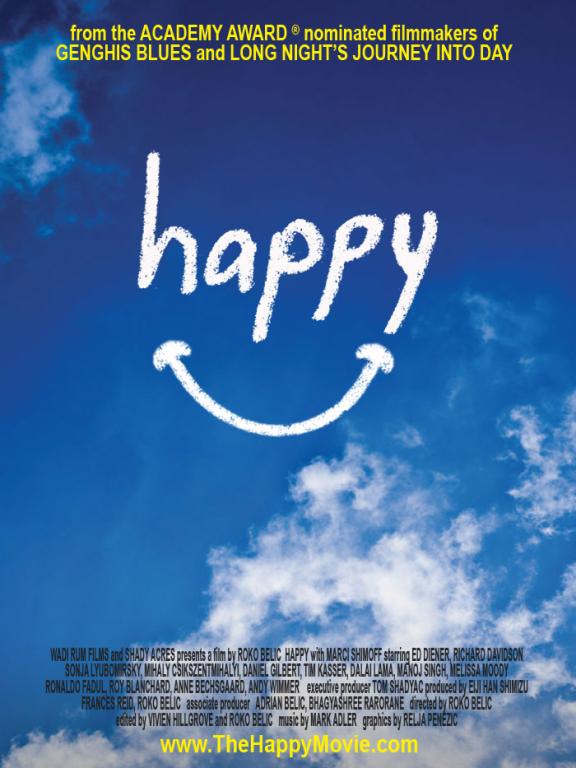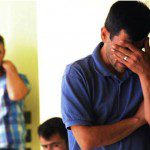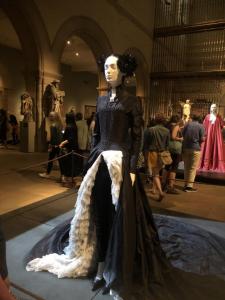One Way or Another
Psalm 1
Happy Homecoming, Riverside Church! It’s such a pleasure to watch the parade of banners and your beautiful faces filling the pews this morning, to hear the voices of our choir back in worship and to see the faces of our little ones, back in Sunday School today. I mentioned a few weeks ago that fall is the start of a new year at church, just like at school, and that newness fills the air and our spirits with optimism and hope.
I recall when my kids were little, getting that list of school supplies, hunting for them at the store, making critical decisions about the color of binders for the year, sharpening pencils to uniform points, and finally lining everything up on the floor to take inventory before loading a brand new backpack.
A new start is always time to take stock, to think about where we’re headed, to set a tone for the year ahead.
I’m frankly having a hard time believing that it has been a whole year since my first Homecoming. This past year has felt to me like a whirlwind, full of shifting around here, some welcomed, some painful, along with the general dis-ease that always comes with change. It occurs to me that as we start out on another year together, some of us may be feeling some fear about what’s ahead, about the future of our church. What’s going to happen next? Will we be ready? How will we make it through whatever comes?
Well, here’s the good news this morning.
We don’t have to worry about the state of our community moving forward, because the Psalmist tells us in today’s Psalm that we can decide how we’ll proceed as we face the future. It’s not what happens to us that determines whether we thrive; whether we thrive is a decision we make. Will we choose health and wholeness, the way of the righteous? Or will we choose death and destruction, the way of the wicked? The Psalmist says: it’s one way, or another.
 In the process of making the award winning 2012 film Happy, filmmakers stopped hundreds of people on the street and asked them what they wanted out of life. Almost all of them said some version of: “I want to be happy.” The idea of the film project was to explore that fundamental question of human life: how can I be happy? How do we build good lives and good communities that reflect the fullest expression of who we are created to be?
In the process of making the award winning 2012 film Happy, filmmakers stopped hundreds of people on the street and asked them what they wanted out of life. Almost all of them said some version of: “I want to be happy.” The idea of the film project was to explore that fundamental question of human life: how can I be happy? How do we build good lives and good communities that reflect the fullest expression of who we are created to be?
Happy opens with the shot of the inside of a shanty in Kolkata Slum, India. The one room hut where a whole family lives is made out of bamboo sticks and plastic tarps, with raw sewage trickling past out front. Manoj Singh, who lives there with his family, grins as he talks about how he really likes his house; during monsoon season, sometimes rain gets in, he explains. But, he says, “Except for that, we live well.” Singh is a rickshaw driver who scrapes together his meager living by running in the hot sun and the monsoon rain, carting people around town, but researchers found that he reported a level of happiness that equaled and often exceeded the happiness of many middle class Americans.
People in the academy are studying this question, too, with new academic fields like Positive Psychology and universities like Harvard and Yale offering classes on happiness or life worth living. In fact, scientists have made surprising determinations about what makes us happy. It turns out that about 50% of what makes us happy is genetically predetermined, and only 10% of what makes us happy is circumstantial: our jobs, our relationships, our financial status. 40% of what makes us happy is our intentional behavior—those practices that we adopt and make regular parts of our lives. 40%!
Turns out that, while the film is excellent and definitely worth seeing, they didn’t really need to make a film trying to discover the answer to the question of how to thrive, because the Psalmist already knew what researchers and moviemakers have found about being happy.
Psalm 1 is the very beginning of a book of biblical poetry that addresses every high and low of human living. Like the thesis statement your high school English teacher kept saying was a must in the first paragraph of an essay, Psalm 1 is the thesis statement of the book of Psalms, addressing that essential question we all ask: how will we live into the fullness of who we are created to be?, by laying out a clear choice for the reader. Which way will you choose? It’s the way that leads to life or the way that leads to death, no in-between.
It’s one way, or another.
Listen one more time to the Psalm:
Happy are those
who do not follow the advice of the wicked,
or take the path that sinners tread,
or sit in the seat of scoffers;
but their delight is in the law of the Lord,
and on his law they meditate day and night.
They are like trees
planted by streams of water,
which yield their fruit in its season,
and their leaves do not wither.
In all that they do, they prosper.
The wicked are not so,
but are like chaff that the wind drives away.
Therefore the wicked will not stand in the judgment,
nor sinners in the congregation of the righteous;
for the Lord watches over the way of the righteous,
but the way of the wicked will perish.
As you just heard, Psalm 1 is a Psalm with three distinct parts. The first part describes what a happy life looks like; the second part describes what a wasted life looks like; and finally, the Psalm sums everything up: the Lord watches over the way of the righteous, but the way of the wicked will perish. The Psalmist is laying it out in front of us—it’s clear, and we all have a choice: one way, or another.
You’ll often hear this Psalm’s beginning translated “Blessed are those…,” but a more appropriate translation of the Hebrew here is “Happy are those…”. And this is important to note, because this Psalm is not setting up a conditional, transactional kind of faith—the idea that God will bless you if you do certain things. No, the Psalmist here is just bluntly describing the kind of practice that it takes to be happy. To live a life of abundance. To grasp the gift of being human and live into the fullness of what God imagines for our lives.
And you’ll notice that the writer of the Psalms uses a metaphor for the kind of human living he describes—he says it’s like a tree planted by streams of water, lush, verdant, flourishing. I learned recently that New York City began a campaign in 2007 to plant one million trees in the city. In this concrete jungle, the shade of a tree is welcome relief. But in the world of the Psalmist, in the desert, the image of a tree takes on whole new and deeper meaning. Trees were even more rare there than in New York City, and to describe a tree with roots reaching down to life giving water, leaves luxuriant and green, fruit in abundance—well that’s a metaphor for the best kind of life one might imagine.
It’s a choice, and you’ll notice most especially that the Psalmist uses the word “planted.” There’s an intentionality about living this kind of life, about the task of being fully human. This kind of health and flourishing doesn’t just happen accidentally; it’s carefully cultivated, a choice—not once, but over and over again: it becomes a way of life. Like modern researchers have re-discovered: happiness takes practice, and intention. Will we choose the way of the righteous, or the way of the wicked? Healthy and whole or limping and broken? Happy or miserable?
It’s one way, or another.
A few weeks ago I read an article in The Guardian about New York City public school teacher Stephen Ritz. Mr. Ritz is a teacher at a high school in the South Bronx he describes as “very troubled.” Most of his students have special education needs, do not speak English, live in foster care situations or are homeless.
He said one day a friend sent him a box of daffodil bulbs, but he didn’t know what they were and thought they might cause problems in class, so he stashed them behind a radiator in his classroom. One day the class noticed something going on behind the radiator and when they looked, they discovered an explosion of flowers. The steam from the radiator made the blubs bloom.
This incident gave Mr. Ritz an idea. What would happen, he wondered, if he and his students worked together to grow something? They began by taking abandoned plots of land in the neighborhood and doing some landscape gardening—just to beautify their surroundings. The kids embraced the projects with enthusiasm, but Mr. Ritz realized he needed more than kids showing up outside of school to participate; he needed them IN school. So he came up with the idea of planting vertical, edible gardens all over the school, and he put the kids in charge.
“Remarkably, the plants grew,” he reports. The kids felt a sense of ownership and investment in the project, and all of the sudden attendance at school increased from 43% to 93%. “Students come to school to take care of their plants—they want to see them succeed,” he said. “Along the way, the kids succeed, too.”
Ritz says this project has changed fundamental things about the kids who attend his school. They learn patience and fortitude; they learn to invest their efforts and watch the results; and they learn all sorts of academic subjects from their cultivation efforts. “A crop well tended will yield a good harvest,” Ritz says.
In the desert, wherever you find water and trees, with fruit…you will find people. We are drawn to this kind of flourishing; we want this kind of health and wholeness and happiness in our lives.
But hear the words of the Psalmist and take heed: this way of being is not something that happens by chance.
No, this way of being comes from avoiding the advice of the wicked; from staying away from people who choose to destroy rather than build up; from keeping yourself out of the way of those who speak evil; from building and nurturing healthy community. And this way of being comes from delighting in the way of God, the way that seeks always love, reconciliation, unity, justice, and peace. That kind of intentionality produces health, wholeness, happiness, even, in our individual lives.
And the same is true for our life together.
As it’s Homecoming Sunday, it seems like today is a good day to talk plainly, then, about the community that we are building together right here. This has been a year of welcoming new faces, thinking hard about who we are, and working together to bring increasing health and wholeness to the communion of saints at The Riverside Church in the city of New York. It’s predictable that there would be some anxiety about what’s ahead. But, as it turns out, we don’t need to be afraid, because we can choose the way we will go.
So today as we hear the words of the Psalmist let’s ask ourselves some hard questions: will we follow the advice of the wicked, take the path that sinners tread, sit in the seat of scoffers? Or will we delight in the law of the Lord and meditate on it day and night? Only one of those will lead us, individually and collectively, to wholeness, health, happiness, righteousness, life.
It’s one way or another. The health and flourishing of our community doesn’t just happen. The Psalmist described it as a tree planted. Mr. Ritz, in the South Bronx said, “A crop well tended will yield a good harvest.” They were both saying the same thing: health and wholeness, flourishing, happiness…is intentionally cultivated. We have to make a choice.
Everyday.
Today as we think about all we have been together and dream about how God will work in this place in the year ahead, the Psalmist is laying it out right in front of us, this choice we have to make. Will we be like dry chaff, garbage, that blows away in the wind? Or will we be like a tiny sapling, carefully planted next to a flowing stream, our roots sinking deep into the rich soil, nutrients helping us grow tall and strong, with thick green leaves and enough fruit to share with the whole world?
Which will you choose? Which will I choose? Which will we choose?
It’s one way, or another.
Amen.












